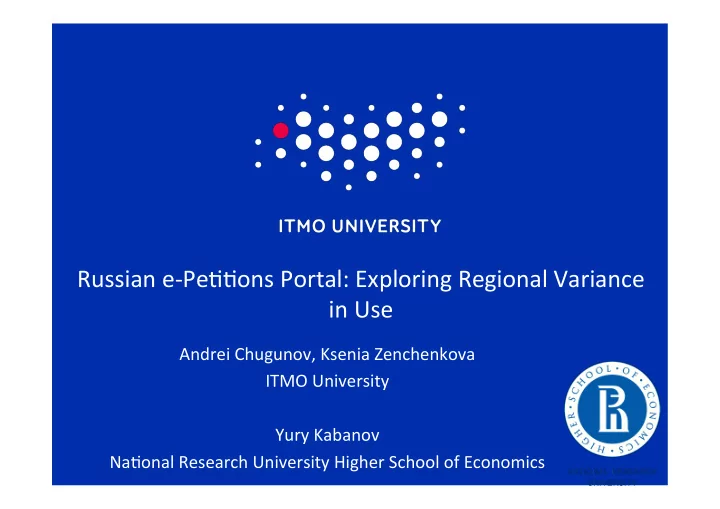

Russian e-Pe++ons Portal: Exploring Regional Variance in Use Andrei Chugunov, Ksenia Zenchenkova ITMO University Yury Kabanov Na+onal Research University Higher School of Economics
Russian Public Ini-a-ve www.roi.ru • Launched in 2013 as a part of President Pu+n’s elec+on program; • Status of the official (legal and legi+mate) e-pe++ons plaWorm (unlike Change.org etc.); • Needs official registra+on via Unified Iden+fica+on and Authen+ca+on System – USIA (legal adults & passport data); • Needs 100,000 votes or 5% of regional (municipal) popula+on to be considered; • Pre- and post-modera+on (by GONGO and special Commi_ee); • No pe++ons have been considered by the State Duma yet; • Different regional dynamics.
Russian e-Pe++ons Portal: Exploring Regional Variance in Use RPI: Na-onal & Regional Dynamics Number of Pe++ons, 2013-16 Number of Votes for Pe++ons, 2014-16
Russian e-Pe++ons Portal: Exploring Regional Variance in Use RPI: Na-onal & Regional Dynamics Number of pe++ons per region, as of 3.09.2016
Russian e-Pe++ons Portal: Exploring Regional Variance in Use Research Ques-on What factors can explain the difference in e-pe++oning and vo+ng among the regions of Russia? Ra-onale 1) Tes+ng theories of (online) civic engagement in a new context; 2) Possibility of a quan+ta+ve compara+ve research (83 cases); 3) Analysis both socio-economic and ins+tu+onal environment.
Russian e-Pe++ons Portal: Exploring Regional Variance in Use Theories and Literature Review: ① Socio-economic status (income, educa+on etc.): u Resource model [Verba et. al, 1995] : +me, money and civic skills; u Post-materialist values [Ingleheart et. al, 2005] . u Social capital and trust [Putnam] . ⇒ persistence of digital par+cipa+on divides: age, gender, income, educa+on, skills [Best, Krueger 2005; Linder, Riehm 2011; Escher, Riehm 2016; Saglie, Vabo 2009]. ② New Ins+tu+onalism and Ra+onal Choice: u Collec+ve ac+on problem [Olson 1971] : incen+ves vs. costs; u Poli+cal efficacy [Finkel 1985] ; u Ins+tu+ons [Hall, Taylor 1996] and ins+tu+onal design [Goodin] => Incen+ves, costs, efficacy and ins+tu+onal environment determine the level of online engagement [Phang et. al 2014]
Russian e-Pe++ons Portal: Exploring Regional Variance in Use Implica-ons for the Russian Case ① Socio-economic status : u High level of socio-economic dispropor+on among Russian regions; u Unequal Internet penetra+on. ② New Ins+tu+onalism and Ra+onal Choice: u Low interest in engagement; poli+cal efficacy and ins+tu+onal trust. u Na+onal authoritarian regime – subna+onal varia+ons; u Dispropor+ons in e-government development in the regions; u Ins+tu+onal design of RPI: USIA effect (Votes needed / Accounts in the USIA)
Russian e-Pe++ons Portal: Exploring Regional Variance in Use Hypotheses: Educa+on Income Internet Use Social Well-Being RPI Pe++oning RPI Vo+ng More Democra+c Regime More Open Government Be_er eGov Policy Lower USIA Effect
Russian e-Pe++ons Portal: Exploring Regional Variance in Use Research Design - Number of cases : 83; - Research period : 2013 – 2015 (average figures); - Methods : correla+on and regression analysis Dependent Variables [ITMO’s automated monitoring system, h_p://analy+cs.prior.nw.ru): - RPI_PET: number of pe++ons submi_ed via RPI in a region; - RPI_VOTE: number of votes cast in a region; Independent Variables: - EDU : percentage of people with a higher educa+on in a region [GKS] - INCOME : middle income in a region [GKS]; - UNEMP : unemployment rate in a region [GKS]; - URBAN, RURAL : share of urban/rural popula+on [GKS]; - INTERNET : number of Internet users in a region [GKS]; - REGIME : regional poli+cal regime [HSE]; - eGOV: quality of regional eGovernment policy performance [E-Readiness Index, IRIO]; - OPEN: informa+on openness of the regional governmental web-site [Infometer]; - USIA_REG, USIA_FED: effects of USIA registra+on [AMS – authors’ calcula+ons]
Russian e-Pe++ons Portal: Exploring Regional Variance in Use Results Region RPI_PET RPI_VOTE RPI_PET 1 ,607** RPI_VOTE ,607** 1 EDU ,692** ,426** INCOME ,427** ,273* UNEMP -,383** -,419** URBAN ,563** ,504** RURAL -,563** -,504** INTERNET ,391** ,347** REGIME ,408** ,322** eGOV ,597** ,402** OPEN -,158 -,097 USIA_REG ,845** ,497** USIA_FED ,887** ,548**
E-Par+cipa+on Portals Automated Monitoring System for Poli+cal and Social Research Discussion and Next Steps 1) More civic online-engagement via RPI is expected in more Internet - developed, urbanized and wealthy regions [Resource model, digital divide]. 2) A rela+vely democra+c subna+onal regime posi+vely correlates with RPI usage [Ins+tu+ons]. 3) Regions with be_er eGov policies are more ac+ve in RPI usage [poli+cal efficacy, Internet skills, registra+on via USIA]. 4) However, the rela+onship between RPI use and other variables seem to be moderated by USIA effect [ins+tu+onal design, costs vs. incen+ves]. 5) The rules of authen+ca+on deepen the digital divide and impose costs on collec+ve ac+on, since USIA effect is less important in developed regions [ins+tu+onal design].
Thank you! Andrei Chugunov (chugunov@egov-center.ru) Yury Kabanov (ykabanov@hse.ru) Ksenia Zenchenkova (rabota.ks@mail.ru) Conference Name
Recommend
More recommend